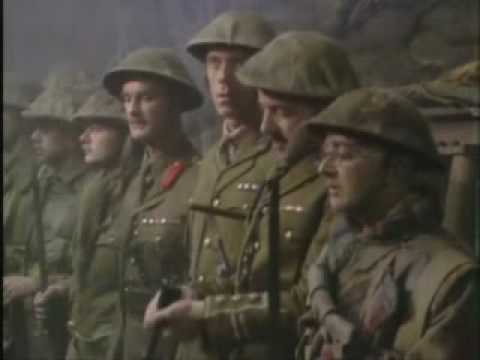There are many myths around the British Army in World War I, the old “Lions led by Donkeys” being the first of them, such as Alan Clark claiming to quote it from a German general’s remark. But in fact he just made that up (and in truth it was actually first used by the French about the British in the Crimean War). Furthermore things such as portrayed in Black Adder Goes Forth where British Generals are completely incompetent public school boy types who live it up in comfort in chateaus miles behind the lines, while sending their men off to their deaths, are just nonsensical and don’t align with historical evidence. While there may well have been one or two real generals like this, the actual majority, and the truth, is likely far from that (you can just look at the casualty rate of senior British Officers commanding Divisions and above for example).
To get a good initial overview and guide of how some facts may have become distorted by the ‘false memory’ of popular myth and perhaps the appropriation of the accounts and artistic licence of poets and artists and authors, I recommend these two Western Front Association Lectures on YouTube. The first, False Memory: What We ‘Know’ About WW1 by Prof. Stephen Badsey (in 2015), casts doubt on many of the myths of the First World War by asking is Blackadder real ‘history…? The second, Mud, Blood and Poppycock by Gordon Corrigan, presented in 2021 follows on from this and the theme of the book of the same name published in 2003. This second one presents some quite telling facts that help put some of the myths and legends of WW1 into clearer perspective and the need to perhaps re-evaluate how we judge these.
Related Books
The above lectures are based on books that have been available for some time that I have in my library – although I have only got around to watching the video lectures recently. The following are (in my opinion) recommended books related to the above (if you watch the videos and want to read more) and help in reassessing the true facts about the leadership and performance of the British Army (and it’s Empire and Dominions) in World War I. Including the war itself, the public support for the war at the time and at the final victory there was jubilation and celebration of victory (there was war weariness but this and a strong peace movement really developed post war; the British public during the war were determined, it seems, to see it through to victory at all costs and wouldn’t accept defeat even in 1918). It also covers the modern creation (and/or inadvertent growth) of many myths and distortions about the war (primarily from the late 1930’s through to the 1970’s).

The first 2 are an excellent overall reassessment based on analysing hard facts and evidence, the second two slightly more technical books looking more into tactics and generalship in more detail, but along similar lines and what do the facts and statistics actually tell us. There is no doubting individual soldiers had horrific experiences, and there were very bad times, but the whole war wasn’t like this constantly. Ironically these are considered revisionist histories, even though the actual revisionism might, in my opinion, have occurred around the 1930’s-1960’s or so – when the myth about a senseless incompetent war for nothing that destroyed a generation emerged. These books are some of the large number of excellent scholarly studies since the 1980’s looking at the true history and examining the real First World War (from the British perspective) based on what the actual records and historical facts say:
Forgotten Victory: The First World War: Myths and Realities by Professor Gary Sheffield (2001) – This contends that the popular view that the First World War was, ‘tragic and unnecessary’, is wrong. It is his strongly argued belief that such a conclusion does not represent the cutting edge of research into the most controversial conflict in British history. Based on twenty years of research, this book challenges the fundamental assumptions underpinning the ‘traditional’ belief that the First World War was a wholly futile conflict.
Mud, Blood and Poppycock by Gordon Corrigan (2003) – The popular view of the First World War remains that of ‘Blackadder’: incompetent generals sending our soldiers to their deaths. Many established ‘facts’ about 1914-18 turn out to be myths woven in the 1960s… Gordon Corrigan’s brilliant, witty new history reveals how out of touch we have become with the events of 1914-18. He shows how necessary our commitment was, and reveals that the British embraced technology more quickly and more effectively than the Germans, amongst other things.
Routledge Studies in First World War History: Doctrine and Reform in the British Cavalry 1880–1918 by Professor Stephen Badsey (2008) – A prevalent view among historians is that both horsed cavalry and the cavalry charge became obviously obsolete, and that officers of the cavalry clung to both for reasons of prestige and stupidity. It is this view, commonly held but rarely supported by sustained research, that this book challenges. It shows that the achievements of British and Empire cavalry in the First World War, although controversial, are sufficient to contradict the argument that belief in the cavalry was evidence of military incompetence. It offers a case study of how in reality a practical military doctrine for the cavalry was developed and modified over several decades…
The Chief: Douglas Haig and the British Army by Professor Gary Sheffield (2011) – Douglas Haig is the single most controversial general in British history. In 1918, after his armies had won the First World War, he was feted as a saviour. But within twenty years his reputation was in ruins, and it has never recovered. In this fascinating biography, Professor Gary Sheffield reassesses Haig’s reputation, assessing his critical role in preparing the army for war.

